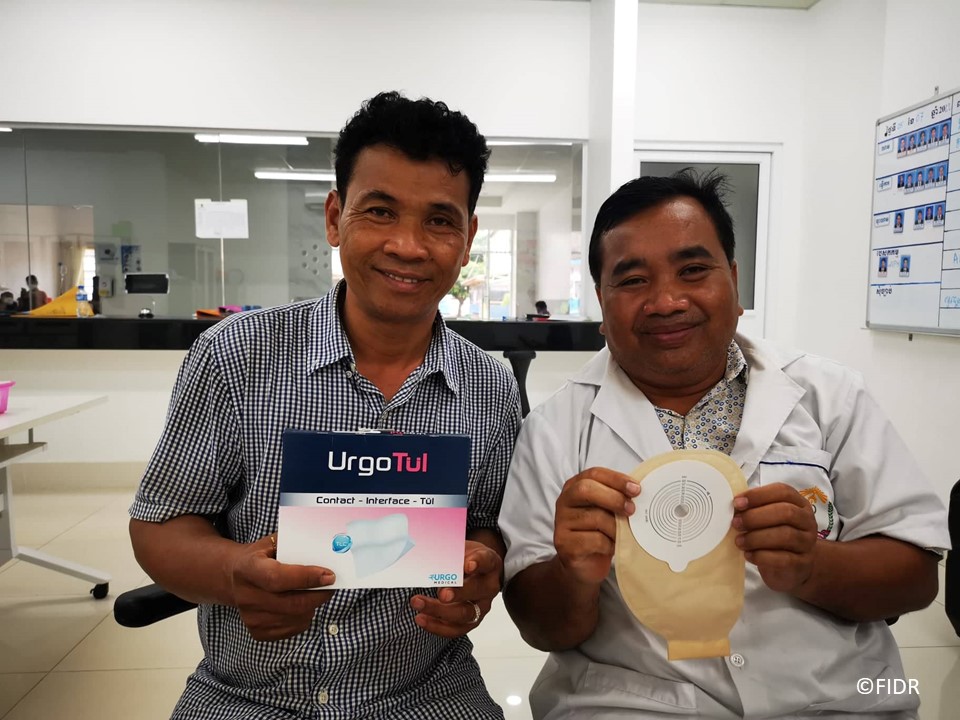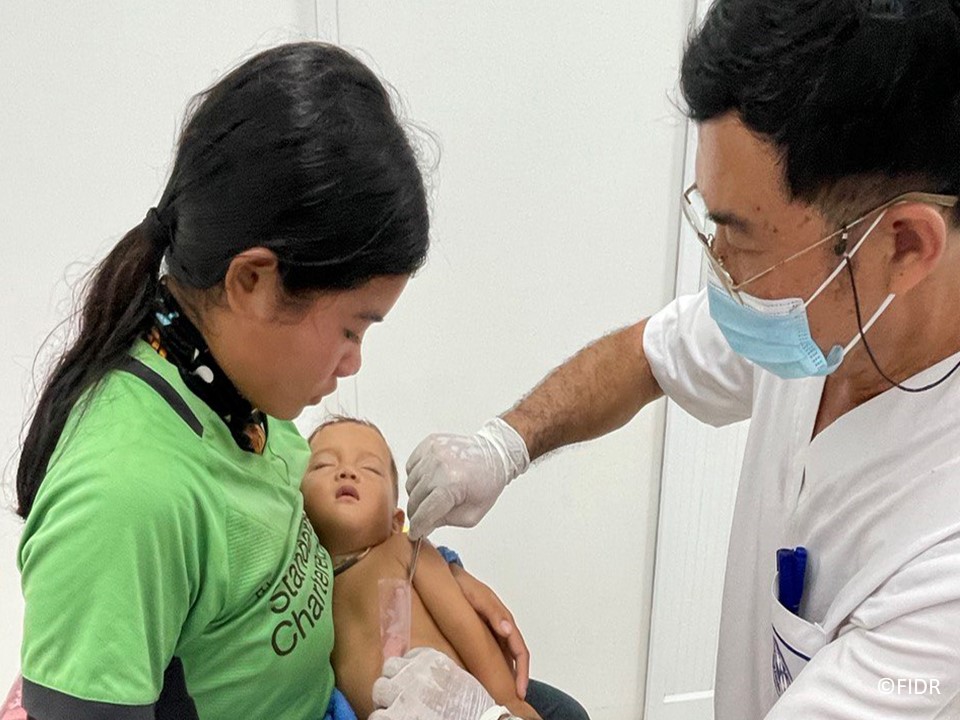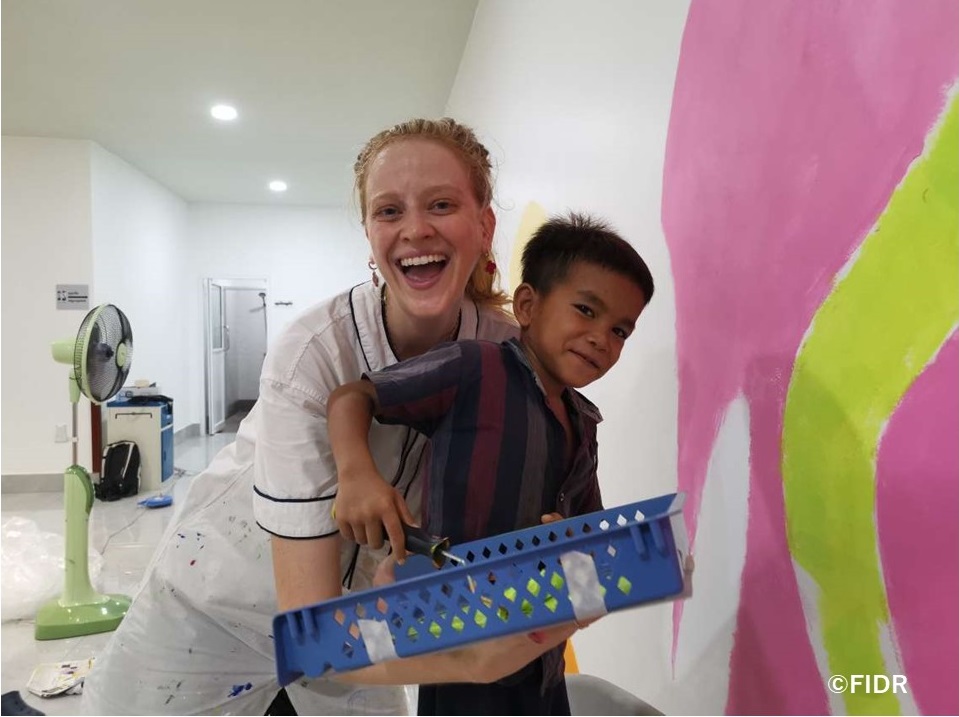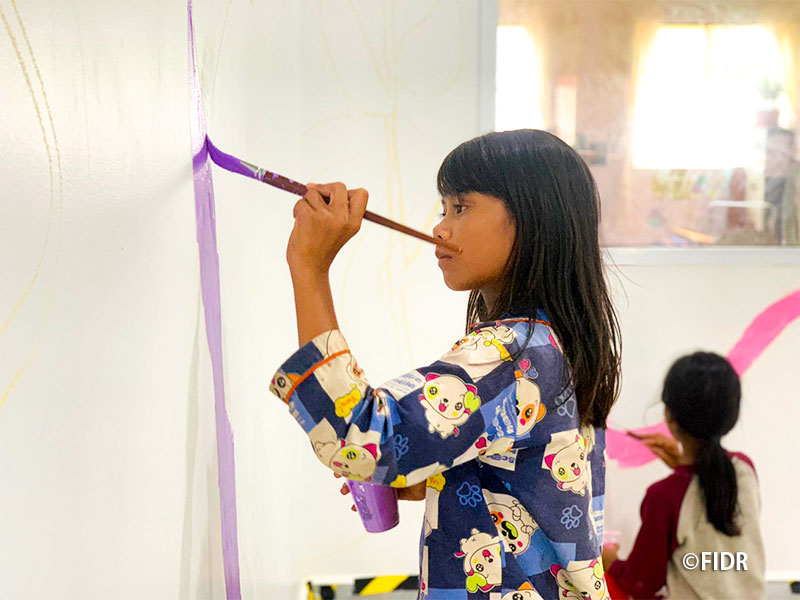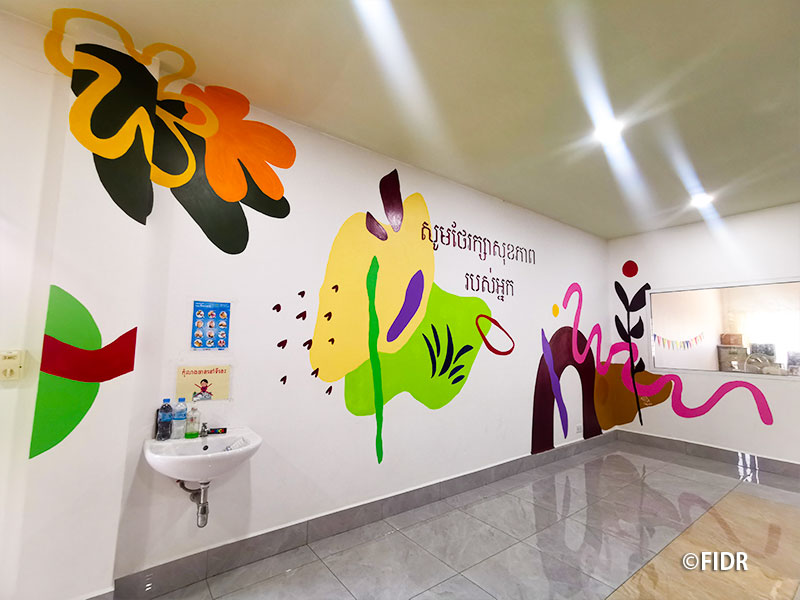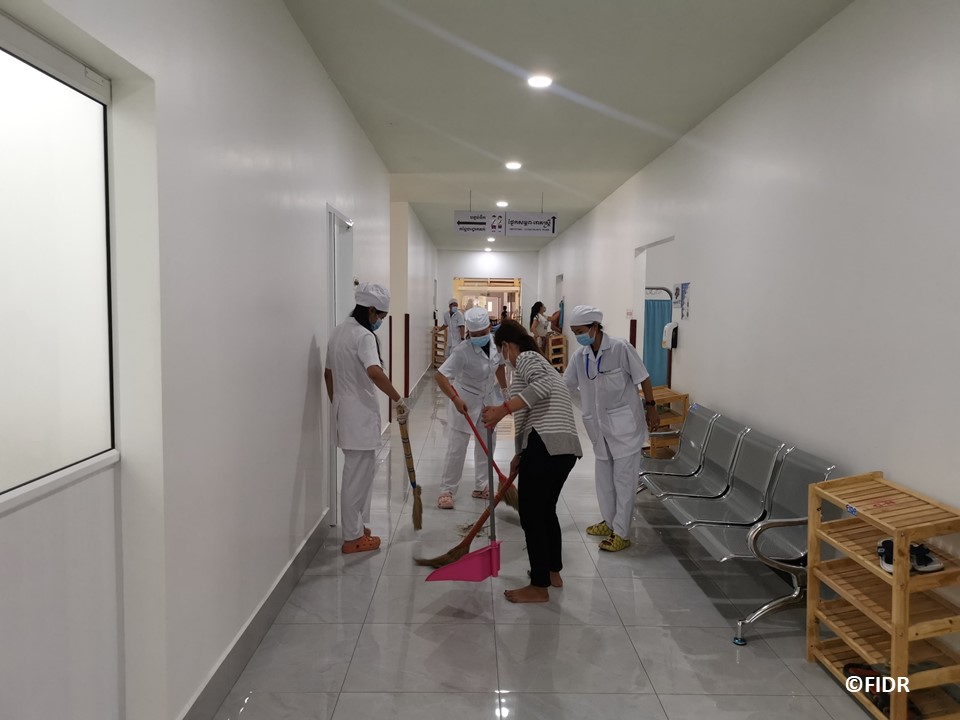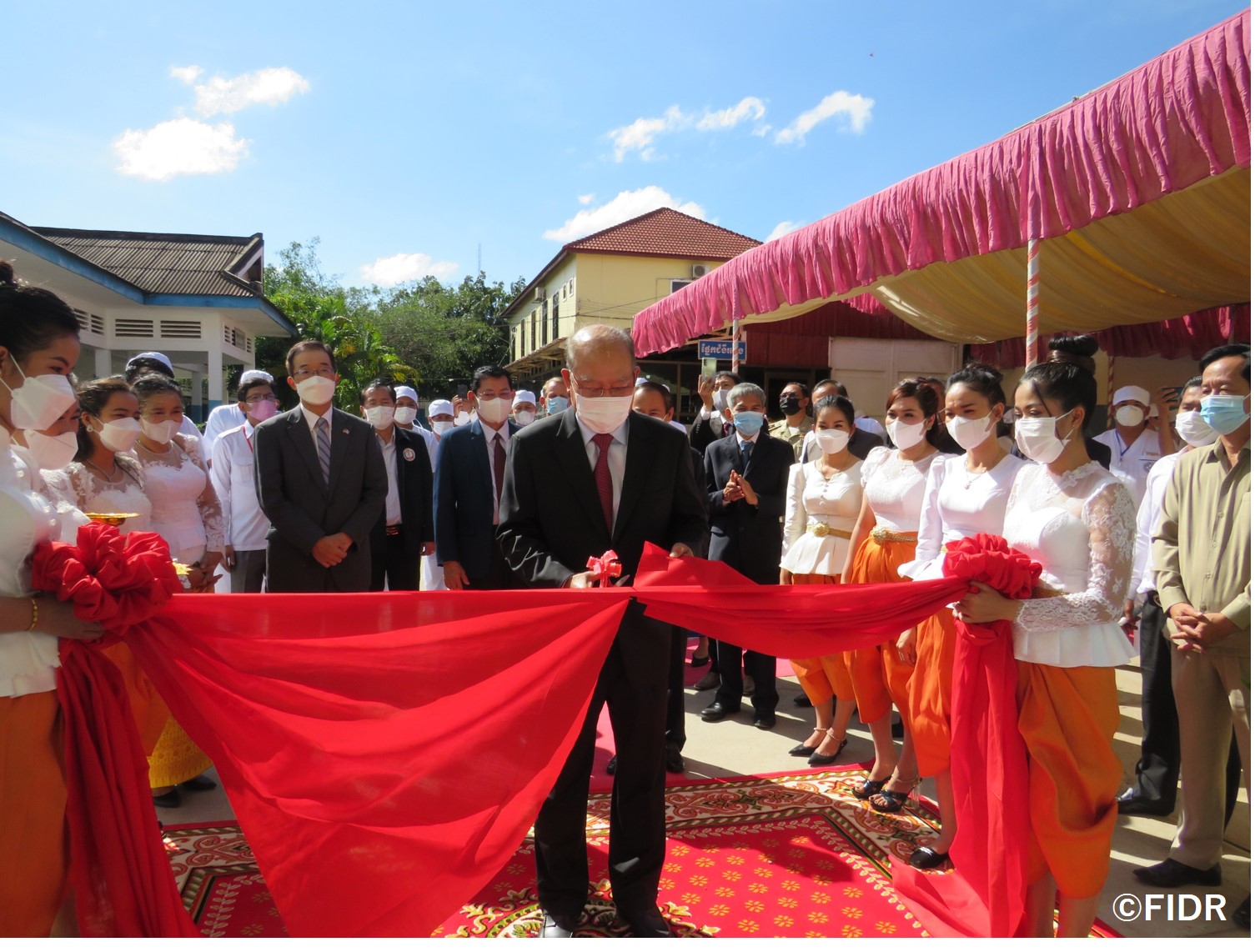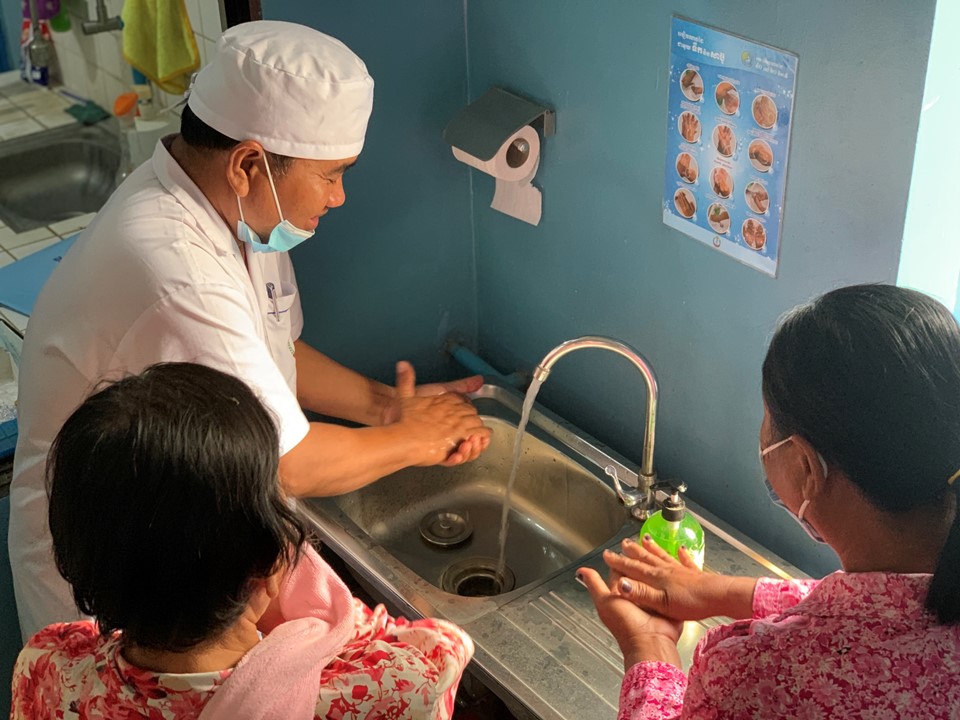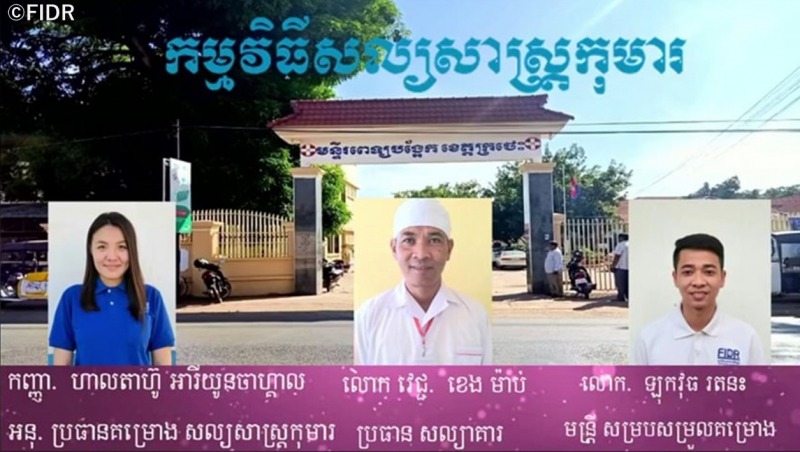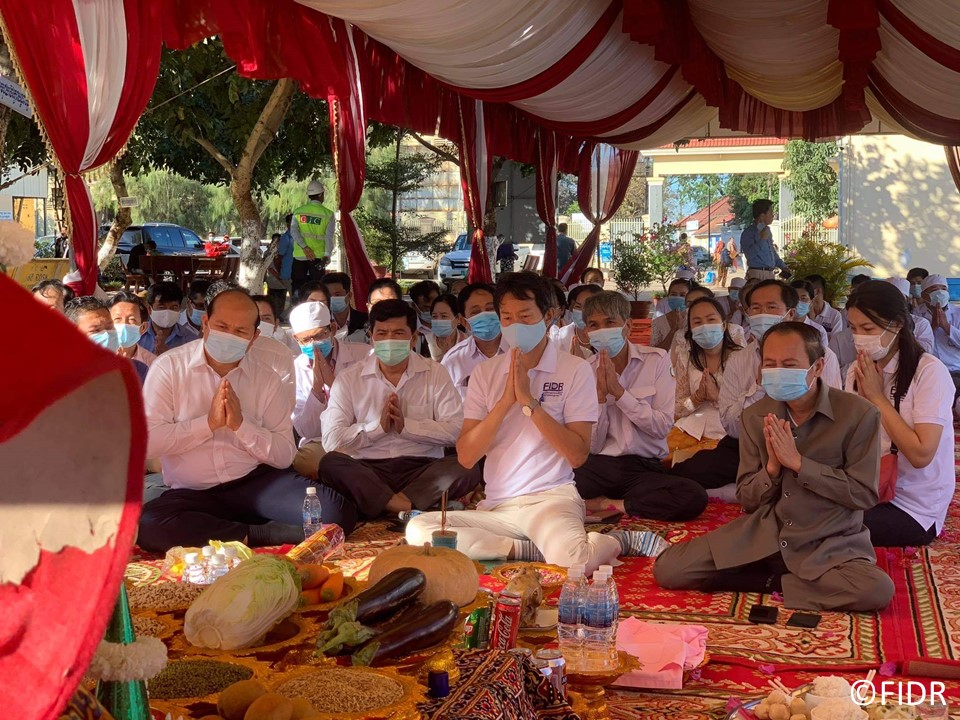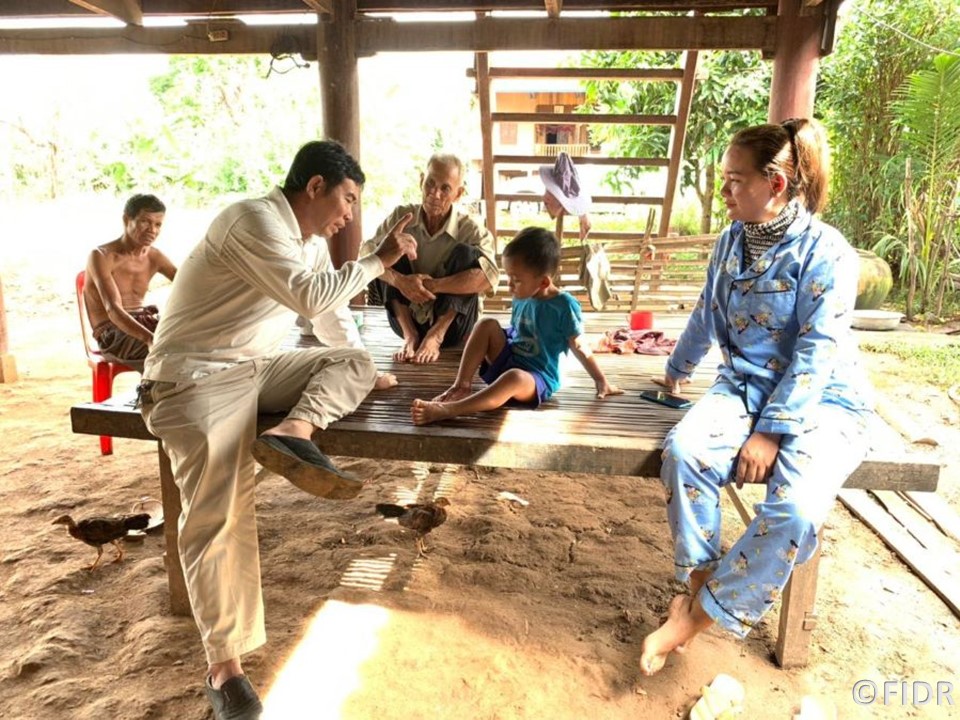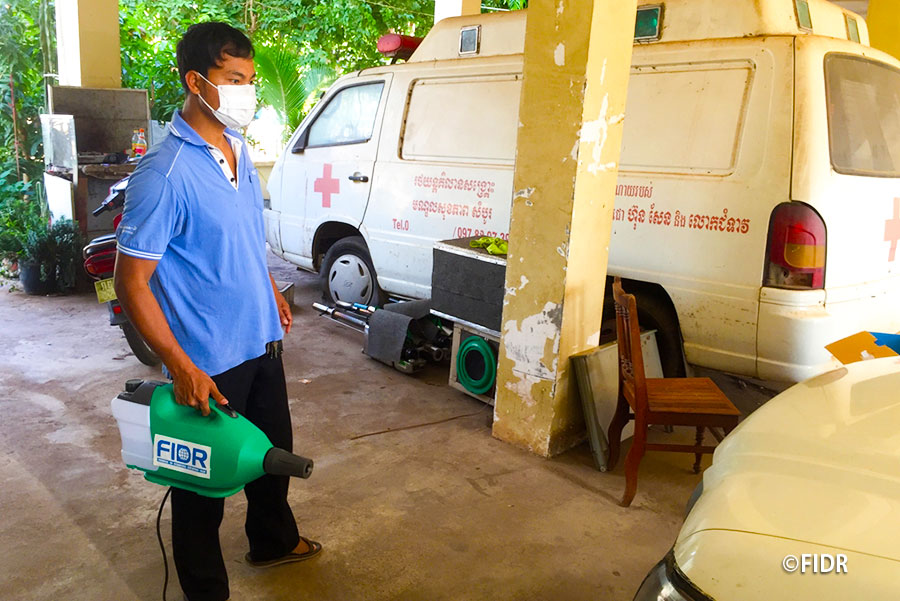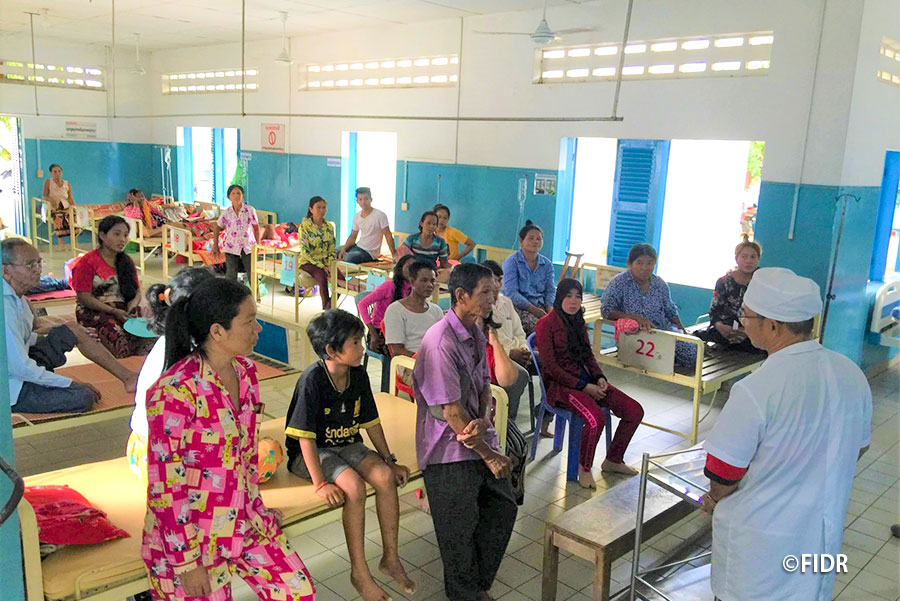FIDR is a non-governmental organization working to support children in developing countries and people affected by disasters.

New medical items are bringing smiles to the Kratie Provincial Referral Hospital!
The Department of Surgery at Kratie Provincial Referral Hospital recently started using four new medical items: an ostomy pouch, petrolatum gauze, a crutch, and a walker.
All of these items are available for the first time in our hospital. Until now, some patients who knew that these medical items bought and used them by themselves; however, this was very rare.
An ostomy pouch is a pouch attached to the stoma (artificial anus or artificial bladder), in which urine or stool can be stored and then disposed of. So far, simple handmade pouch has been used at our hospital, but there have been issues with the leakage of bodily waste and the stress on the patient's skin. Manufactured pouch allows people with reduced bowel or bladder function or who have had their bowel or bladder removed due to illness and can live their daily lives with few restrictions.
Petrolatum gauze is gauze soaked in petrolatum to keep the wound moist. Our hospital has started using it to care for babies' wounds after they have been burnt by boiling water. As the gauze does not stick to the skin, it eases the pain caused when changing the gauze.
Hospitalised patients now use crutch and walker. Patients with leg injuries can move more easily, such as from their rooms to the toilets.
Before starting to use these medical items, we paid attention to the training of the surgical staff on how to use these items. With the help of nurses assigned to the hospital as the Japan International Cooperation Agency team, we informed the surgical staff in detail about the use of each item and the precautions in using it. The training was repeatedly conducted.
In one of the training sessions, hospital staff explained how to apply an ostomy pouch and the precautions while doing it and showing it to the participants. This is so that family members of patients who have undergone surgery to create a stoma can take care of the patient on their own after discharge from the hospital.
The new medical supplies have not only helped to heal injuries faster and more reliably, but have also improved pain relief and infection prevention. Also, patients now can walk and rehabilitate with more stability, and it brings smiles to the hospital staff and patients.
These medical items were donated by FIDR to the Kratie Provincial Referral Hospital, with funds raised by the Interact Club and the first and second-year students of the English Department at Okayama Gakugeikan High School. We sincerely appreciate the support of the students of Okayama Gakugeikan High School.
The power of art that brightens the hospital and the feeling of patients
We invited French artist Alexia who was based in Cambodia to lead a mural art project in the newly completed building of surgical ward at Kratie provincial referral hospital. We always wanted to brighten up the building and give warm feeling to patients.
Alexia decided to volunteer on this project from designing to painting with the participation of pediatric patients and hospital staff. We now have beautiful arts in the patient’s hall and pediatric room, representing abstract shapes among which we can figure seeds for a better future here, a road to the sun and a smiling face there along with a red dot, nod to the Japanese flag for FIDR! Happy faces of kids, creative times with the hospital staff resulting in a bright and warm space, we feel that we could bring art and medical care together. Thank you so much Alexia!
Hereafter is some expression of Alexia after finishing the mural art project during 3 days in Kratie.
---------------------------------------
My idea of the art project was to bring comfort, support and life to the place in a way that it could speak to the most. We decided to build the compositions around supportive words in Khmer for people who can read: “get well soon” and “we wish you a good recovery”. To complete the project, a whole corridor is saved for patients to write other healing words. The overall design is made for our imagination to build up our own story.
The challenge was to make it happen in 3 days, at the peak of the hottest season in the country and in a collaborative way involving families of patients, kids, doctors, nurses or hospital staff speaking different languages. There was a lot of thing to do: washing the walls, protecting the floors, drawing the models I designed, coating colors in the correct order, washing the brushes, applying new coats, smoothing the outlines, washing again and always…
Thankfully, many staff members and patients, families of patients, kids, doctors, nurses contributed in the work! Handing a brush with a happy smile, a little bit of music, and a giant fan was my best move for making it collaborative! They wanted to be part of it and paint with my guidance, most of them never had a brush in their hands. I still remember the face of this young nurse pouring deep brushes of a bright purple paint on the wall for the very first time, ecstatic. Many patients were also just happy to sit and enjoy the show, look at the process of the murals shaping up.
I have this moving memory of two young girls recovering from a traffic accident. We were exchanging nothing but friendly smiles during long hours, they were lying in bed, me bending over the wall. When they had regained enough strength to leave the hospital, they came to me and thank me. They couldn't tell me why exactly, but their happy faces... And that's all what matters: being able to share emotions or good vibes through images that can be both soothing and stimulating, in a place housing patients and families in distress.
A challenge of Surgical Ward Staff in making new building cleaner
A new building of Surgical Ward of Kratie Provincial Referral Hospital (KPRH) was inaugurated in December 2021, and it has been functioned since then. A month later, we found many problems occurred such as: dirty floor, spider nets, uncleaned patient rooms, etc. There are two cleaning staff in the surgical ward, but the building is large and the inpatients change rapidly, so it is difficult to keep the building clean all the time. After seeing the situation, hospital director had meeting with all Surgical Ward staff to discuss the solution and they decided that “Let’s clean the building regularly by our nurses and doctors”
On the first cleaning day, all doctors and nurses of Surgical Ward as well as cleaners and workers of the hospital joined in cleaning all parts of the building. When the nurses and doctors clean the building, patients and their caretakers also joined and started cleaning their bed area. In addition, we heard some positive impressions from Surgical Wards staff such as, “It’s really fun to clean our building” and “We don’t have any opportunities that all staff gather at one time and do something together. It’s good that we can work all together and build more communication between staff in the department through this cleaning activity.”
Since that time, surgical ward has been conducting monthly cleaning day to keep the building clean and provide the good environment for patients.
Recently, the new surgical ward building is very clean and patient and staff are happy to see the changes. The management team of KPRH is recommending other departments to follow Surgical Ward in keeping their buildings clean.
We strongly hope that our activity could be sustained for long time and keep our building clean and hygiene for the patients
An inauguration ceremony of new building was conducted
As new building of surgical and maternity wards of Kratie Provincial Referral Hospital (KPRH), which had been under construction since December 2020, were completed in October 2021. On December 6th, FIDR and KPRH collaborated in conducting an inauguration ceremony of the building.
On the day, we hosted over 200 guests including the Cambodian Minister of Health, Ambassador Extraordinary and Plenipotentiary of the Embassy of Japan in Cambodia, Governor of Kratie Province, provincial government officials, medical staff and representatives from the construction company. After the congratulatory speeches of Minister of Health, Ambassador of Japan and Governor of Kratie Province as well as a ribbon-cutting ceremony, FIDR and KPRH staff guided the guests the inside of new building which has been operating since the end of November. Inpatients and their families shared that they were staying comfortably in the newly constructed rooms.
The construction of these wards has become possible thanks to the Grant Assistance for Japanese NGO Projects provided by the Ministry of Foreign Affairs of Japan, as well as donations and support from many supporters.
The Ambassador expressed his respect for the Ministry of Health, the Provincial Health Department, KPRH and those who have been working sincerely in order to improve the medical quality even under the difficult circumstances due to COVID-19. He said that "I hope these newly constructed building will be used for a long time as a symbol of friendship between Japan and Cambodia."
Minister of Health showed his gratitude to the Japanese Government and Japanese citizens for their continuous support in the medical field of Cambodia, and highly appreciated FIDR for having trained medical staff, prepared medical equipment and built new building in KPRH.
Through the activities of FIDR, medical staff in KPRH have been improving their skills year by year. Together with the new building, it is expected that the hospital will provide more rapid and appropriate medical service to the local people living in the northeastern area of Cambodia. Both FIDR and the hospital staff recognize that "The completion of new building is not a goal." FIDR will continue to support them so that they can use the new building effectively.
The ceremony drew local media attention and was featured on TV and in newspapers.
https://www.khmertimeskh.com/?p=984159.
Medical staff of Surgical department with new experience in COVID-19 patients’ treatment
Katie Province, where FIDR has been conducting the Pediatric Surgery Project (PSP), confirmed its first positive case of COVID-19 in this April 2021. Since then, Kratie Provincial Referral Hospital (KPRH) plays a critical role in treating COVID-19 patients in the province. Hospital doctors and nurses have been providing treatment on a rotation basis. From late May to early June, two staff from the surgical department, Dr. Sovandara (surgeon) and Mr. Sotheara (nurse), joined the COVID-19 treatment team. We had an opportunity of interviewing them about their experience during the treatment time and their intention in improving the service of Surgical department.
- Q1: This is the first time when you got involved in the COVID-19 treatment team. How did you and your family feel?
- Mr. Sotheara: Firstly, I felt a little bit nervous but this is my work, so I tried my best for the work. My family was also concerned because they were worried that I would be infected by COVID-19.
- Dr. Sovandara: My family was also worried, but they understand the meaning of this work so they supported me a lot.
- Q2: What was your role when you joined the team?
- Mr. Sotheara: I involved in the team 24 hours per day. When new patients who concerned about the COVID-19 were admitted into the hospital, we had to check the symptoms of patients, do the rapid test and take the specimen for PCR test to send to a laboratory in Phnom Penh.
Every day, I started at 8 am by visiting patients, checking vital signs, providing medicine to patients. I had to check them frequently, and whenever they had any changes in symptoms, I immediately reported to doctors for treatment. - Dr.Sovandara: I and one more doctor were in charge of treatment for 16 patients during 14 days.
- Q3: Is there any difference compared with treatments of other diseases and what was the most difficult task for you?
- Mr.Sotheara: There was one patient in a severe condition. He also suffered from diabetes. He had difficulty in breathing, and the oxygen meter showed just 80%. His body temperature was high, from 37.5 to 38.6oC. Therefore, I tried to spend more time to take care of him. He had difficulty in breathing for 6 days, so I got a request from doctors to take X ray of the patient. We found out that he had a problem with his lung. After that, we continued to treat him, and after 8 days, he got better and was discharged from the hospital,
- Dr. Sovandara: The symptom of COVID-19 patients quickly changed. Therefore, we had to take care for 24 hours and follow up the patients as quickly as possible. We also visited patients more frequently. We divided patients into three categories - minor, moderate and severe - and allocated to three different rooms. We visited patients with minor symptoms twice a day, but we had to visit patients with moderate or severe symptoms 4-5 times, even more than 10 times per day.
Moreover, because we had to wear PPE all the time, we could not touch patients directly nor listen to their lungs and heart. What we could do was to ask about their medical history and symptoms. - Q4: What kind of preventive measures do you and other staff in the hospital take?
- Mr. Sotheara: During the care, I followed guidelines of MOH regarding to preventive measures, such as wearing PPE, spraying my body and hand with alcohol before and after wearing PPE.
Regarding conditions of patients, we divided them into three categories in different rooms. But the rooms are in front of each other. So I also worried that, when patients and staff go in and out the rooms, the virus can be spread between the rooms. - Dr.Sovandara: We have an isolation room for COVID-19 patients in Emergency Department. Patients cannot meet the visitors or families during this time. In the surgical department, we also use masks and alcohol and take body temperature before entering the building.
- Q5: How do you think after completing the treatment time?
- Mr.Sotheara: I already have experience to take care of COVID-19 patients during this time, so if I was assigned in the team one more time, I think I can do it.
- Dr.Sovandara: It was a good experience for me to join the team because I learned how to protect patients and visitors. I want to help more patients.
After having joined the COVID-19 patients’ treatment team, Dr. Sovandara and Mr. Sotheara found some improvement points of their daily work.
Since the symptoms of COVID-19 patients quickly change, doctors and nurses have to be ready 24 hours a day. In addition to the regular visits in the morning, noon, and evening, they visited patients whenever their symptoms changed. For severe cases, they visited their patients more than 10 times a day. Dr. Sovandara said, "Before being involved in the treatment of COVID-19 patients, I visited patients only when they requested to do so. Now I will try to visit them frequently and take care of them more."
In addition, nursing care for COVID-19 patients is also different from typical nursing care in Cambodia. Normally, patients are usually accompanied by caretakers (mostly family members), and caretakers take care of patients while doctors and nurses provide medical care. However, in the case of COVID-19, caretakers are not allowed to enter patients' rooms. Therefore, nurses provide nursing care instead of caretakers.
Mr. Sotheara commented, "We have conducted patient education and informed patients of the importance of handwashing, wearing masks and keeping social distance as preventive measures for COVID-19. After taking care of COVID-19 patients, I realized that the combination of diabetes and COVID-19 is fatal. I will conduct patient education also about healthy diets to prevent diabetes from now on."
We hope that what they experienced during the treatment and care of COVID-19 patients will be utilized to improve the hospital environment including hygiene status and prevention measures, and eventually lead to the improvement in the treatment and care of pediatric surgical patients.
Emergency support for patients and staff who are under quarantine in Kratie Provincial Referral Hospital
Cambodia is facing its biggest COVID-19 outbreak since February 20th community event. As of June 19th, The Ministry of Health reported a total of 42,711 COVID-19 cases with 37,489 recoveries and 431 fatalities, all but 1714 of which were linked to the February 20th community event. The Administration Kratie Provincial Hall reported a total of 21 positive COVID-19 cases with 12 recoveries and 1 fatality. Whereas, 8 patients are continuing their treatment in Kratie Provincial Referral Hospital (KPRH).
On June 5th, 2021, Kratie province confirmed its first fatal case in the province. The patient was admitted to the surgical ward of KPRH with chest pain and difficulty in breathing. According to the doctors, the patient died of a severe respiratory crisis caused by the COVID-19.
Right after, staff, patients and caretakers who were at the surgical ward during the positive patient’s stay had been required to do quarantine for 14 days. Due to this unprecedented situation, KPRH has requested FIDR to support protection products for staff, patients, caretakers who are under quarantine as KPRH was facing shortages.
50 bottles of alcohol sanitizer spray for quarantined people for their personal use, 30 liters of alcohol disinfectant, 15 boxes of face masks, and 10 bottles of liquid hand soap for patients and staff at the surgical ward to prevent transmission during the quarantine were distributed. KPRH has expressed their gratitude to FIDR’s timely support and action. In results of the precautions, no hospital acquired infections has been detected yet.
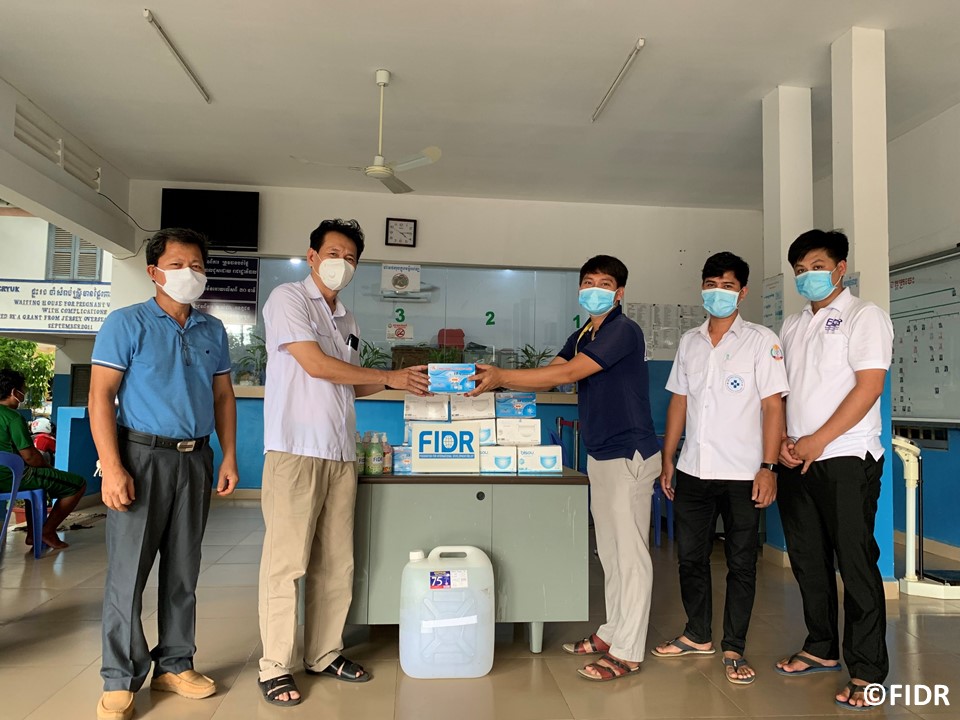 The handover to KPRH (from left: Mr. Sum La, admin manager of KPRH, Dr. Heng Sokhan, director of KPRH, Mr Soun Kimratanak, project facilitator of PSP, Mr. Roeun Daren, assistant Administrative Director, Mr Nam Vicheka, project facilitator of PSP)
The handover to KPRH (from left: Mr. Sum La, admin manager of KPRH, Dr. Heng Sokhan, director of KPRH, Mr Soun Kimratanak, project facilitator of PSP, Mr. Roeun Daren, assistant Administrative Director, Mr Nam Vicheka, project facilitator of PSP)
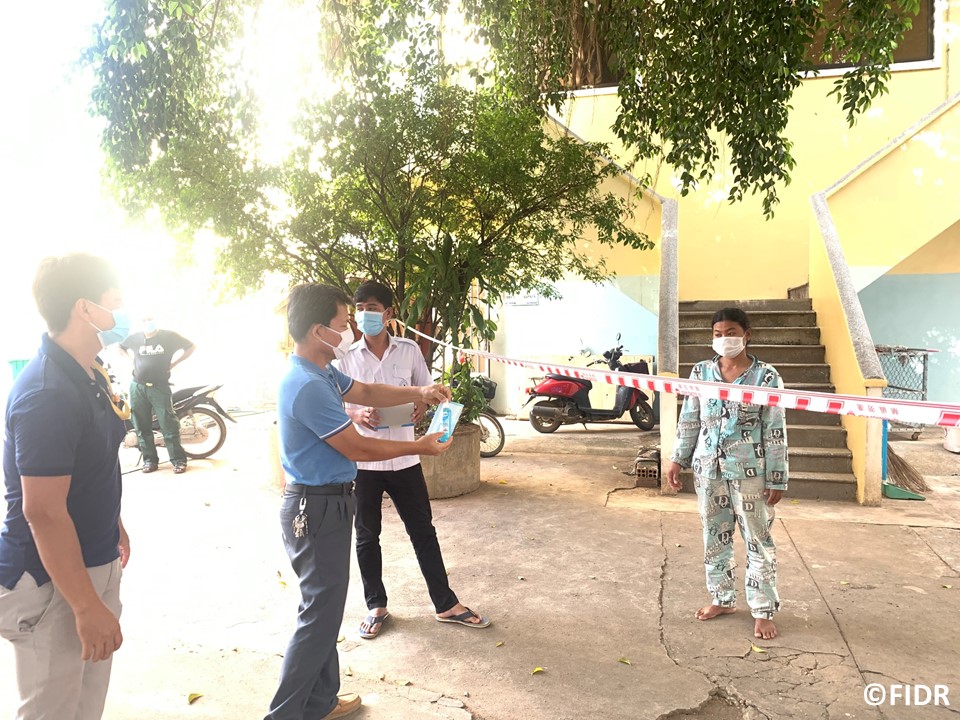 Mr. Sum La, Admin manager and Mr. Roeun Daren, Assistant Administrative of KPRH has distributed the alcohol sanitizer spray and face masks to the people in quarantine.
Mr. Sum La, Admin manager and Mr. Roeun Daren, Assistant Administrative of KPRH has distributed the alcohol sanitizer spray and face masks to the people in quarantine.
Inside Kratie Provincial Referral Hospital's construction site: Safety measures we take
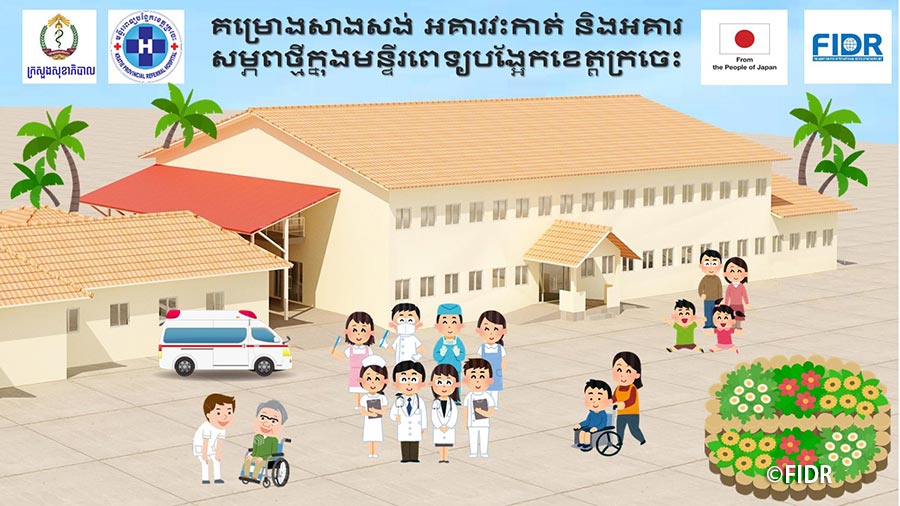
Image of the completed building
A new building of surgical ward and maternity ward is under construction in Kratie Provincial Referral Hospital (KPRH) to improve the hospital environment, especially the environment for pediatric surgical treatment.
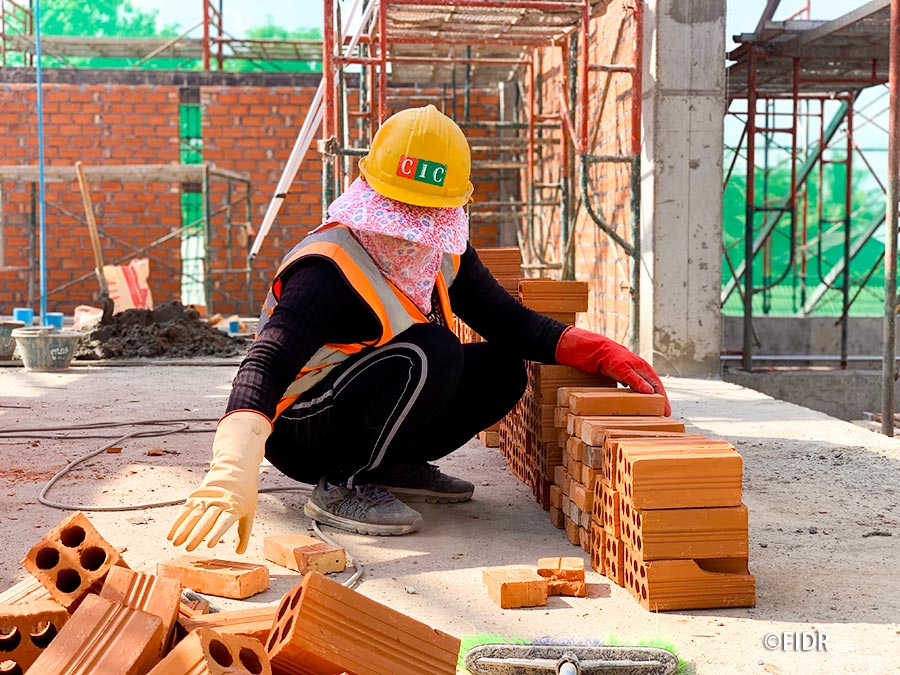 Worker preparing the bricks for the wall construction
Worker preparing the bricks for the wall construction
Currently, the structural works for the ground floor is finished, ready for other works to be done such as: wall plastering, ceiling work and floor tiling. The progress for the first floor, installation of brick wall and structural work of the roof are under construction. Mr. Phoung Sopha, the site engineer, expressed that the construction workers have not faced any problems with safety, since its commencement in the end of December, 2020.
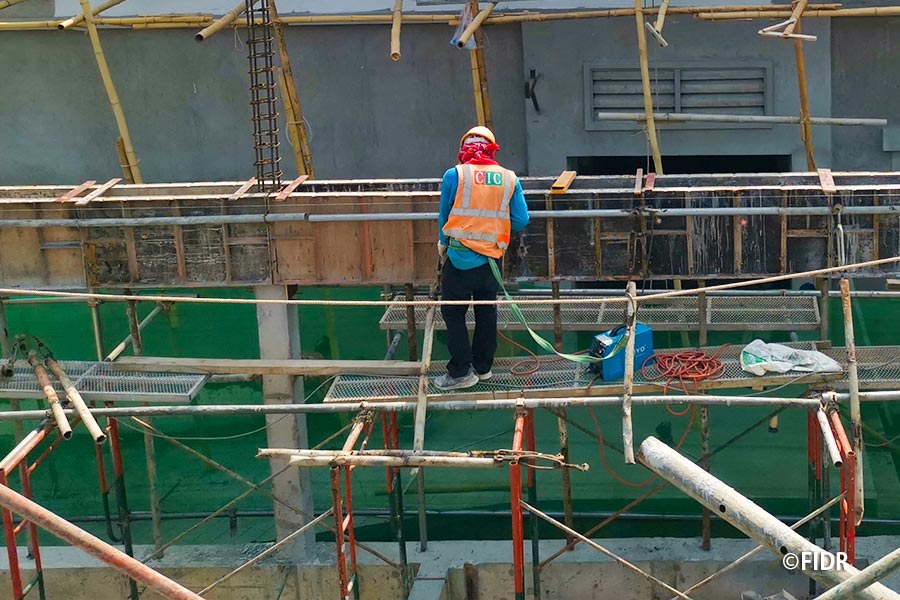 Construction worker working at tall area using personal protective equipment
Construction worker working at tall area using personal protective equipment
Mr. Yait Vannak, the superintendent, expressed that safety measure is one of the most important duties at the construction site, in order to manage the construction schedule and protect the construction workers. On construction site, personal protective equipment such as high visibility clothing, safety helmets, gloves, foot protection, safety belts are always required. Furthermore, installing fence around the construction area and placing signs are to keep both workers inside and patients and hospital staff outside.
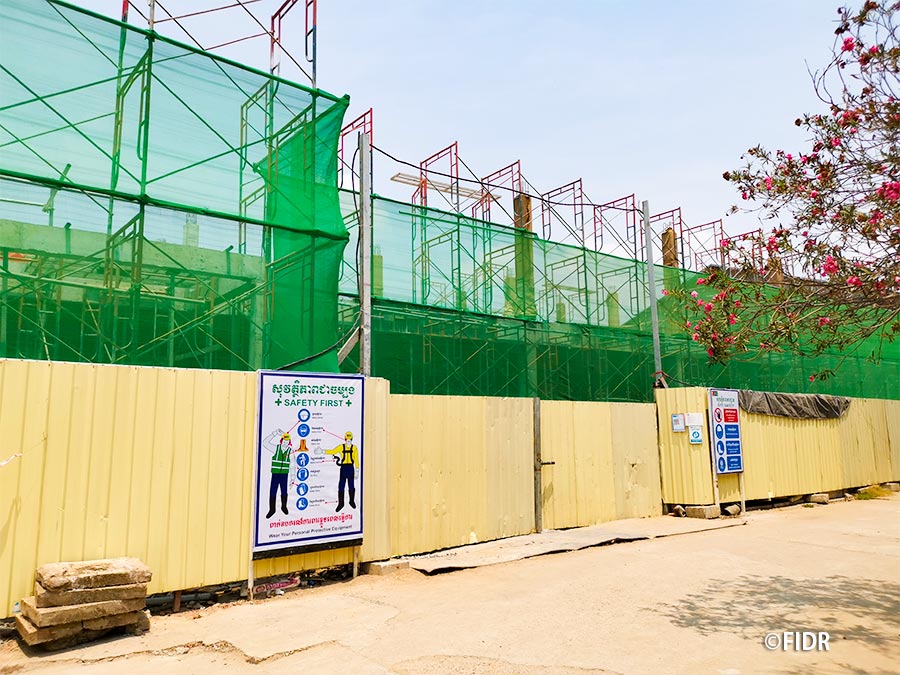
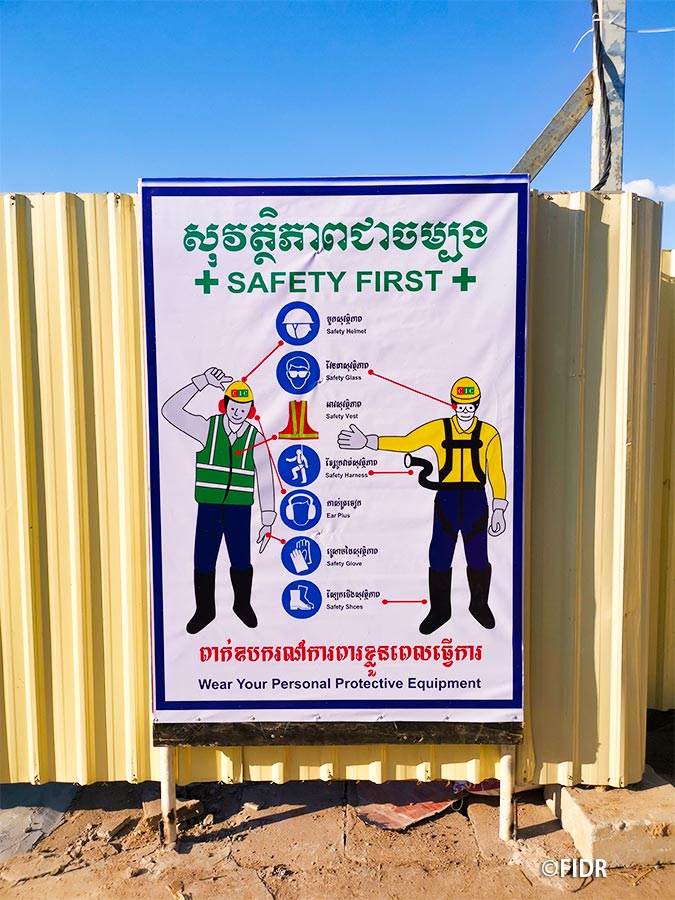
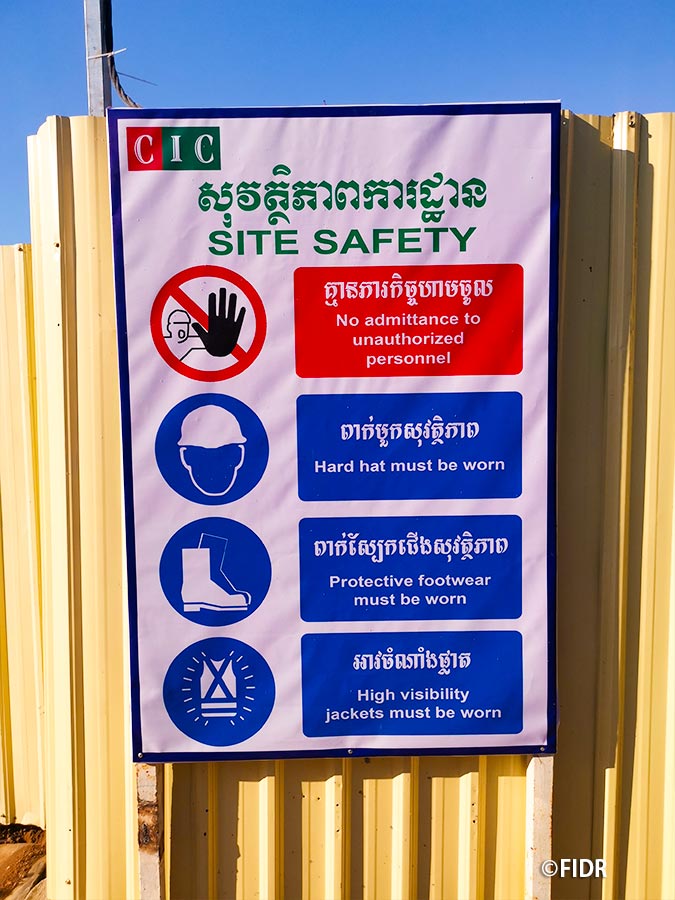 Signs at the construction site
Signs at the construction site
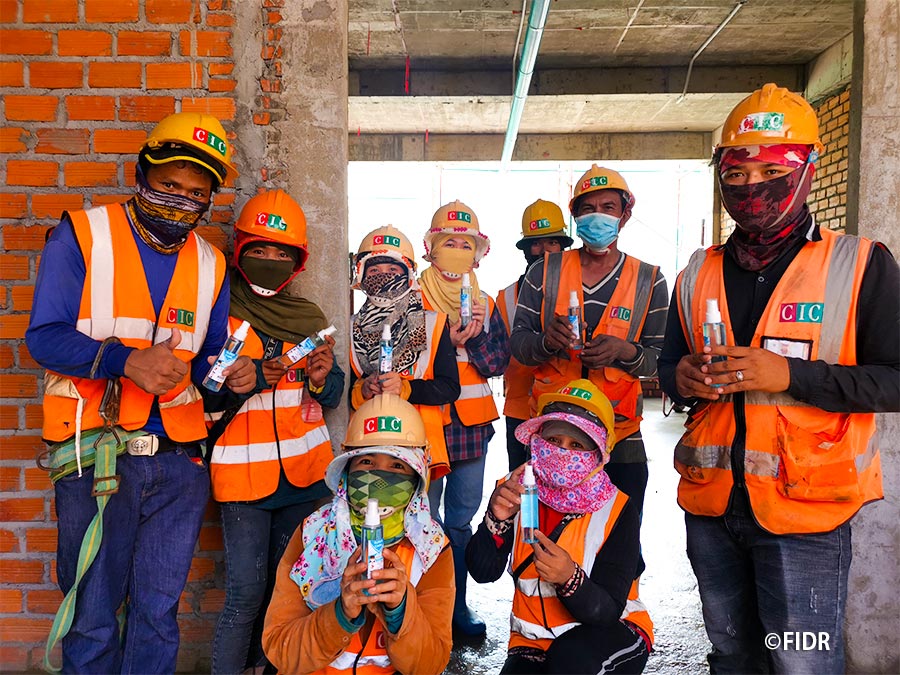 Workers posing with their alcohol sprays
Workers posing with their alcohol sprays
Everywhere around the world is facing challenges to control the spread of Covid- 19, and our construction site is no exception. Workers wear masks, check their body condition daily by measuring temperature, and keep their hands as clean as possible by placing hand washing area at the site and using alcohol sprays.
Having construction work at the hospital area needs further care to implement the safety measures, to ensure comfort and safety of the hospitalized patients. As the new hospital building is expected to be completed by the end of 2021, the safety measures will be implemented strictly during the work.
An online medical study session between Cambodia and Japan was conducted
FIDR has been providing trainings for surgeons and medical staff in Kratie Provincial Referral Hospital (KPRH) which is located in the northeast Cambodia with the purpose of improving the medical services in the area.
In-hospital training is one of the trainings. The aim of this training is to review the daily work and improve medical services by sharing knowledge and experience about diseases and treatment methods between hospital’s staff.
As a part of in-hospital training, the first online medical study session was conducted on March 11, 2021. Surgeons and nurses from the Department of Surgery at KPRH and anesthetist, Dr. Kobashi Yurie from Japan, participated in the session.
The theme of the session was "Anesthesia for Caesarean section" and participants actively exchanged opinions on the differences between Cambodia and Japan regarding the flow of anesthesia procedures, written informed consent to be obtained from patients, preoperative examinations to be performed, restrictions on food and drinking water before the surgery, types of anesthetics and methods of usage, etc.
In particular, they seemed to be interested in the criteria for choosing between general and spinal anesthesia in patients undergoing a cesarean section, the differences between anesthetics and methods of determining the level of anesthesia for patients.
One hospital staff said, "I learned a lot about the usage of different anesthesia methods depending on the urgency of surgery". Furthermore, there were a number of findings for each staff, such as no significant differences in the type of consent forms obtained from patients, the type of tests performed before surgery, or the time of dietary restrictions.
Other staff mentioned that "By explaining our anesthesia method to a Japanese doctor, we were able to concretely understand that what are commonplace for us may differ in other countries such as Japan”. This was a valuable opportunity to have a look at their skills and knowledge.
In Cambodia, due to the spread of the novel coronavirus, the movement of people is restricted which had an impact on the project's activities. Dr. Kobashi commented, "In order to continue conducting online study sessions, a stable internet environment is necessary. I am glad to know that the Internet environment is getting better in Cambodia, and we can conduct such an online study session without any problems. I think we need to hold more training sessions like this in the future."
We will continue on providing trainings for surgeons and hospital staff by applying new methods which are suitable for the situation.
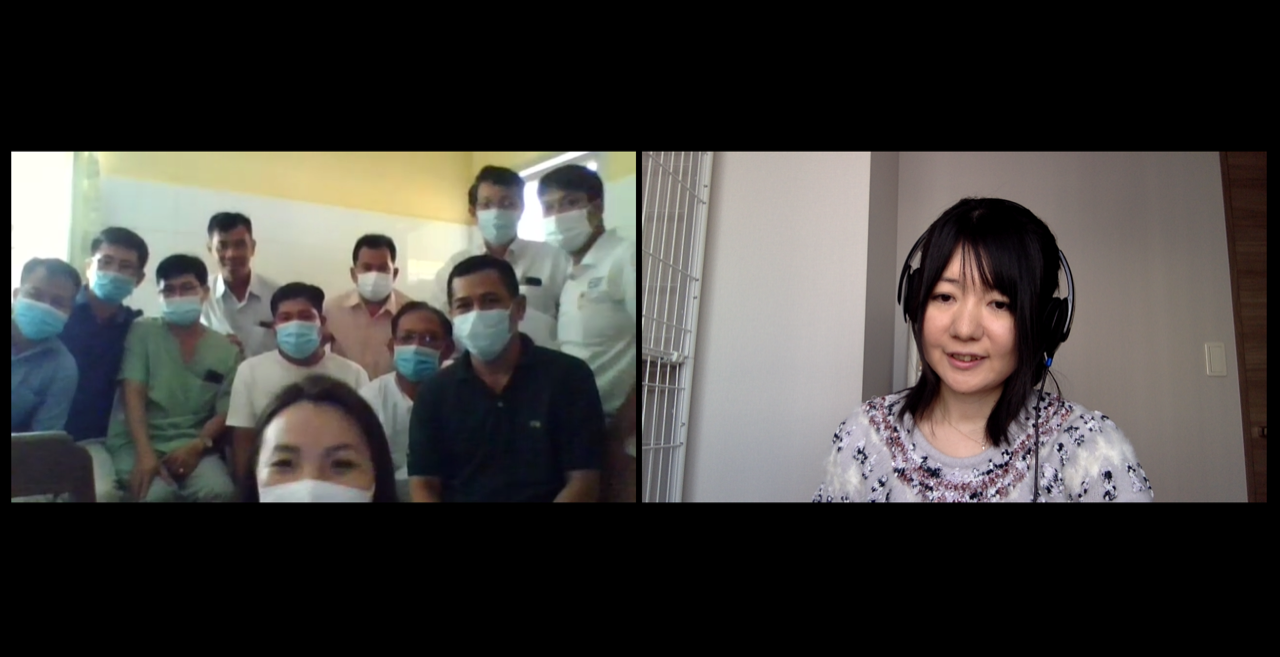
Picture in the right: Dr. Kobashi
Picture in the left: KPRH staff, Ms. Ariun - Project’s deputy manager, Kimratanak – FIDR Project facilitator.
Consciousness of hospital staff as well as in-hospital environment has been improving
Kratie Provincial Referral Hospital (KPRH) is a main healthcare facility of the region which has a responsibility to protect the health of 400,000 residents in the area.
Four years have passed since FIDR started Pediatric Surgery Project at KPRH. During 4 years, we can see the changes in hospital staff’ consciousness as well as in the in-hospital environment.
Before the project started, the in-hospital environment was not so good with rubbish everywhere and bad smell from clogged toilets. Neither hospital staffs nor patients problematized the situation.
However, there were some staff who wanted to make changes for the better. Those were the Director of the hospital, some doctors and nurses who had been trained at National Pediatric Hospital with support from FIDR in the past.
Together with these members, FIDR supported in improving the environment of toilets, water place and garbage collection area. The more improvement was made, the more hospital staff became aware of the importance of the cleanliness in the hospital. Toilets of other departments were renovated with the initiative of hospital staff. The area which used to be full of rubbish was turned into flower garden.
“We always want to make a comfortable place like this”. The thought of the chief nurse became a driving force for changes. Now, hospital nurses call on the patients to keep the hospital clean: “This toilet was rebuilt beautifully by Japanese people. Now it’s our responsibility to keep it always clean to show them our appreciation”
It was not only hospital staff’ awareness toward the improvement of the hospital environment but also awareness toward the patients have been changed.
It’s important to do a post-operative care after patients were discharged from the hospital. However, not so many people return to the hospital for the health check-up. Therefore, there were nurses who said “We would like to visit patients who were discharged from the hospital”.
Pediatrician - Dr. Tomohiro Ishii, who has been involved in FIDR’s Pediatric Surgery Project for years as an expert, said “Whenever I visit KPRH, I, together with hospital staff, have been thinking about what we need to do to improve the Pediatric Surgery Department. Recently I feel their consciousness has been changing in a positive way. As staff of the main hospital in Kratie Province, now they have realized how important their roles are to Pediatric Surgery”. Dr. Ishii also pointed out the importance to keep supporting hospital staff to take the initiatives and feel fulfilled in their duties.
Support from outside organization like FIDR is just an opportunity to encourage local people to make changes. The sustainability of the impact depends on each hospital staff. FIDR will keep moving forward with hospital staff, who play the most important role in the hospital, so that KPRH will become a reliable hospital that could treat children in rural area.
Pediatric Surgery Project Featured on Radio Program in Kratie Province
In Cambodia, especially in rural areas, residents do not go to medical institutions despite experiencing symptoms of illness. The Health centers, the nearest medical institution in the village, are available for these residents, but sometimes they do not feel the need to go to, or rely on traditional medicine, which may delay their visit. Since young children cannot explain their symptoms or condition in words, if adults do not have the correct knowledge, it can be too late to receive proper treatments.
Pediatric Surgery Project is carrying out public awareness activities through radio, in order to help children to be treated properly and timely.On Jan 29, two FIDR staff members and a surgeon from the Kratie Provincial Referral Hospital (KPRH) appeared on the radio and spoke about ‘Symptoms of Pediatric Surgical Diseases’. (Simultaneous broadcast through radio and Facebook Live.)
Dr. Mab of KPRH described the following cases among pediatric surgical diseases: The first is about diseases that require urgent treatment and those that do not. The second is common diseases that patients tend to rely on traditional medicine and delay the consultation of medical doctors, such as burns, fractures, and animal bites.
Furthermore, he introduced the Health Equity Fund, which covers medical examinations and surgical operation expenses for those with low-income so that parents won’t have to worry about the financial strain of visiting a doctor. He added that hospitals could also consider exempting these expenses. He appealed to audience, “The top priority is to bring your child to the Health Center when getting sick. In the case that the condition is serious, hospitals can provide the treatment instead of the health center. Remember to go to health center first to save children’s lives”.
During the broadcast, audience immediately asked about medical facilities in Kratie province where pediatric surgical patients could receive treatment as well as the possibility of surgery. The fact that the number of views on Facebook exceeded 800 in the first day after the broadcast indicates a high level of interest in this topic among residents. The radio segment will be rebroadcast for a month, and Facebook and YouTube videos will be archived.
Picture: (From the left) Ms. Ariun - Project’s deputy manager, Dr. Mab - Surgeon of KPRH and Mr. Rotanak, FIDR project facilitator. Background is the front gate photograph of the KPRH.
Construction of surgical ward and maternity ward of Kratie Provincial Referral Hospital has started
Currently, a new building of surgical ward and maternity ward is under construction in Kratie Provincial Referral Hospital (KPRH) to improve the in-hospital environment, especially the environment for pediatric surgical treatment. Its groundbreaking ceremony was held on January 11.
Around 60 participants, including the Governor of Kratie Province, representatives of Provincial Health Department and hospital’s staff attended the ceremony. Monks were also invited to the ceremony, and together with all participants prayed for the completion of the construction. The ceremony lasted about an hour, and the Governor of Kratie Province expressed his gratitude to the people of Japan for their continuous support to Kratie province and commented that "Today I am very glad that surgical ward and maternity ward of KPRH is renewing their buildings, so I would like to request all hospital staff to take good care of the patients and provide good service".
Since the current building of surgical ward is separated from the operating theatre, before and after the surgery, patients have to be transferred by stretchers outside through the buildings of two wards even in rainy or sunny weather. In order to improve this situation, the new building of surgical ward and maternity ward will be built next to the operating theatre.
In addition, the new building is also nearby pediatric ward, which means all the clinical departments related to child care will be physically integrated. So, these departments will easily cooperate to provide the appropriate care to pediatric patients depending on their growth condition and symptom. Mr. Saeki Kazato, the Country Representative of FIDR Cambodia, emphasized the importance of realizing the "Team Medicine" and said, “When each staff and each department work together and utilize their speciality to treat patients, KPRH can become the role model of team medicine in northeastern Cambodia”.
Currently, foundation work is underway to complete the construction at the end of 2021. The construction is proceeding speedily with the noise and safety measure being taken so that it will not disturb hospitalized patients.
Post-operative care is important to improve the quality of pediatric surgery.
Post-operative care is essential to check whether patients are recovering smoothly without complications and whether the treatment was appropriate or not. However, in Cambodia, once patients are discharged from the hospital, they do not usually return to the hospital for the health check-up, even if doctors ask them to do so. Patients of Kratie Provincial Hospital (KPH) are no exception . FIDR has been supporting nurses of KPH visiting houses of patients who were discharged from the hospital for post-operative care.
On October 21, 2020, FIDR staffs visited a 3-year-old boy in Banley village, Kratie Province with Mr. Ketty, the nurse of KPH who had taken care of the boy since he was admitted to the hospital. The boy was hospitalized at the end of March 2020 for one month due to burns on both legs. Before he visited KPH, his mother and her neighbors had not known how to treat the burns. Therefore, his mother applied "toothpaste" to his burned legs at home and had the burns disinfected at an acquaintance's clinic. After four days, he visited KPH with his wound worsened.
It seemed that after discharging from the hospital, the boy had no concerns about complications or abnormal movement disorder. However, a part of the burns became red-black keloid scar. If this scar expands, there would be a concern of causing dysfunction of the body that needs further surgical operation. Therefore, Mr Ketty advised the mother to observe her son carefully.
The mother seemed relieved to hear that the post-operative process of her son was going well. It was also the first time for Mr. Ketty to visit a patient's home to check the patient's recovery condition after discharging from the hospital, and he could reaffirm the importance of post-operative care. He shared his phone numbers to the mother, so that the mother could contact to get his advice when she has any concerns. The mother deeply appreciated Mr. Ketty and said, "Thanks to Mr. Ketty, my anxiety has eased."
Actions for Preventing COVID-19 in Hospitals and Other Health Institutions
In Cambodia, the first infected case of COVID-19 was reported in late January and its spread hit the peak in mid-March. Although the number of new cases was temporarily increased in July, it has been decreasing. Only a few new cases were reported in September. During this term, FIDR has been taking various measures to prevent COVID-19 depending on the spreading situation.
1. Challenge during the operational suspension
In late March 2020, FIDR was forced to suspend the project activities due to the increasing infectious risk. In Cambodia, especially in provinces, health facilities didn’t equip preventive materials and disinfectants enough. Receiving the support request from our counterpart, Kratie Provincial Health Department, FIDR remotely conducted the emergency relief providing 140 boxes of surgical masks, 27 forehead scan thermometers, and one foggy machine for alcohol disinfection on 22nd April to Kratie Provincial Health Department. The materials were distributed to 1 department, 3 hospitals, 26 health centers, 14 health post, and other 3 health institutions. This relief was enabled by the financial commitment from one Japanese company, Sonton Holding Co., Ltd, the supporting corporate member of FIDR.
2. Learning how to wash hands in the hospital
In May when the number of infected cases started to decrease, FIDR resumed activities.
In June, FIDR collaborated with hospital nurses to conduct “Patient Education” in Kratie Provincial Referral Hospital. The nurses gave short lectures on “How to wash hand?” for patients and their families. They learned the proper way of hand washing using soap and practiced inside the patient room. One of the participants said, “I got to know that there are several steps to wash hands thoroughly. I will keep practicing handwashing to protect myself and my family”.
3. Advocacy in the community
FIDR also supports health centers in the community to conduct trainings sharing knowledge of surgical diseases. In villages of provinces, people could hardly learn health instruction directly in person. We are planning to invite public health officers from the authority and utilize this opportunity to disseminate preventive measures of COVID-19 to local people.
An opening ceremony of new project phase in Kratie province
The pediatric surgery project which has been implemented by FIDR at the National Pediatric Hospital (NPH) from 1996 for the past 20 years has expanded its activities to Kratie province - a northeastern province of Cambodia since this fiscal year. To commemorate this event, an opening ceremony was held in Kratie province on August 7. In the ceremony, we had an opportunity of welcoming approximately 100 people including Mr Okamatsu - FIDR’s director board member, Doctor Ishii who have a huge contribution in the project for a long time and Mr Okada - FIDR’s Secretary General coming from Japan, as well as Director of NPH, Director of Health Department of Kratie Province, Director of Kratie Provincial Hospital, Director of Health Centers in the province, and the doctors/ staffs of Kratie Provincial Hospital who will be the target beneficiaries of the project.
Mr Okamatsu introduced the significance of FIDR's support on surgeon's postgraduate training at NPH that"There are still many areas in developing countries where the access to surgical operations is limited. If patients who need surgery can access surgery operation easily and receive appropriate treatment, more children can be saved their lives".
Director of Health Department of Kratie Province mentioned that "Since the emergency referral system in the province will be strengthened with FIDR support, we will take our first effort on calling to the parents and caretakers of pediatric patients to bring their children to the hospital for examination".
Finally, Mr. Okada FIDR Secretary General presented the plate engraved with the names of Cambodian Ministry of Health, Kratie Provincial Hospital and FIDR.
Through this new phase, we try to build a medical system in which Kratie Provincial Hospital will be in the center of pediatric surgical management in the northeastern Cambodia with a strong partnership, so that more children can receive appropriate treatment in the local.
Proceeding to New Stage
In April 2017, the new local basis of FIDR is going to set up in Kratie province, one of the northeast area in Cambodia. Departing from Phnom Penh, 6-hour driving brings you to the province where many tourist likely visit to enjoy nature and to meet wild dolphins. On the way to Kratie, you will see peaceful landscape along national roads, crossing the bridge “Kizuna” constructed by Japanese governmental aid, and sometimes rough and sandy roads make your travel thrilling.
You can see Kratie Provincial Referral Hospital in the central city of Kratie. The hospital is the biggest general hospital in the province. That’s exactly our next basis for new Pediatric Surgery Project. Furthermore, they receive referrals from other hospitals and even other provinces that indicates possibility, in the future, to become a hub hospital in this region.
So far, FIDR has supported National Pediatric Hospital (NPH) in Phnom Penh over 20 years. The extremely long-term cooperation enabled the hospital to sufficiently provide treatment for patients in medically satisfying level. Over ruin of medical human resource and building due to past civil war, FIDR had been proceeding with NPH in order to help surgeons, anesthetists and nurses develop more and more as well as supports for facility reinforcement. As a result in NPH today, it becomes the national leading institution of pediatric surgery for both performance and education in Cambodia.
From such kind of experience, you can see a new age coming that skill and knowledge of pediatric surgery should be succeeded from Cambodian persons to Cambodian persons.
In 2017, FIDR and stakeholders in Kratie province will commence a new project for 5 years. Skill and knowledge of NPH would facilitate medical staff in Kratie to provide pediatric surgical treatment appropriately. Of course, health staff of NPH is highly expected to work out as resource persons.
It seems that a long way is waiting for us for the achievement. However, for the sake of children, FIDR is going to move forward together with the help of NPH, health institutions and medical staff in Kratie, and all stakeholders as well as Ministry of Health, and Japanese experts.
« Introduction of Team »
The team of Pediatric Surgery Project has been elaborating to weave a new project plan everyday. You can watch video messages from us, telling what kind of impression through experience in FIDR, and also wishes to this new project!
Chea Sophal (Project Manager)
Dok Bunsovann (Project Coordinator)
Prum Tiny (Senior Project Facilitator)
















